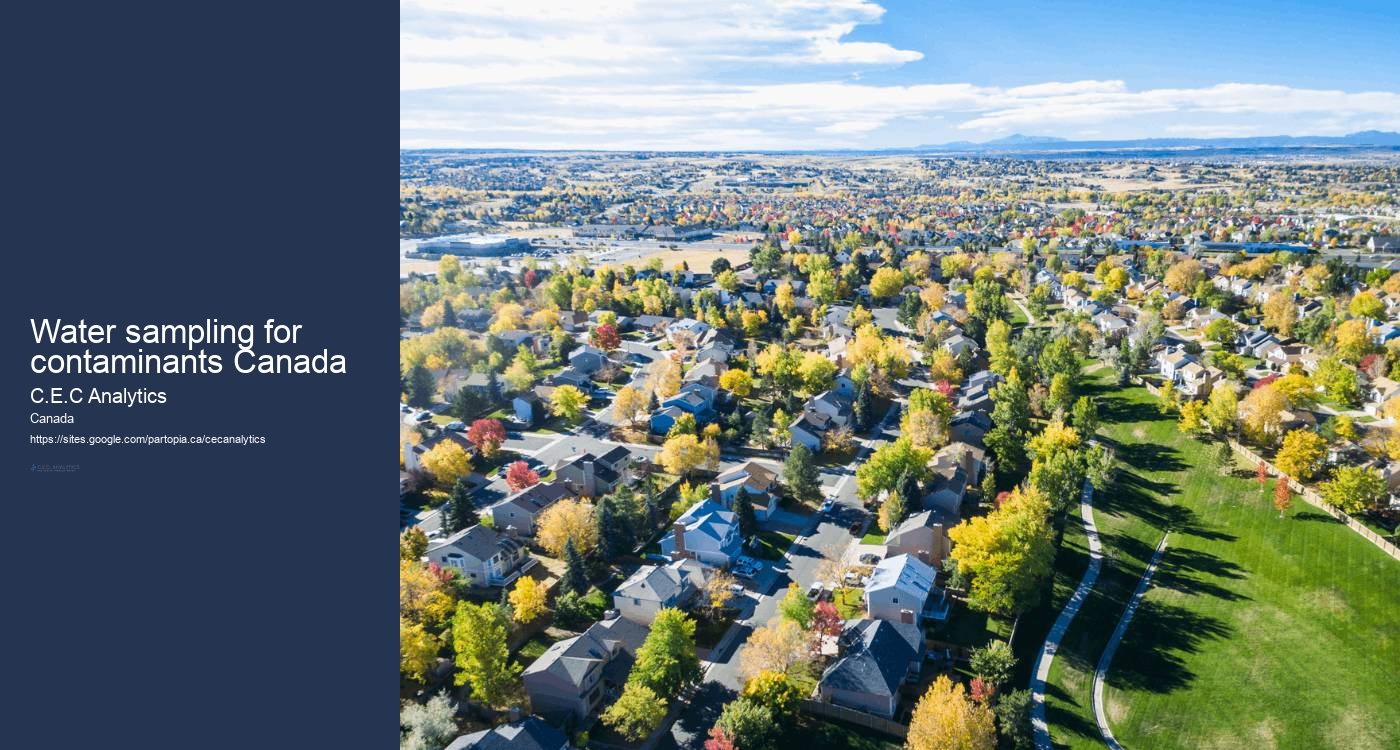

In the coming years, we're diving deeper into research and development to introduce cutting-edge solutions that'll tackle even the most challenging water quality issues. When you consider the importance of clean water in our daily lives, it's clear why the company's mission is so crucial. Learn more about Water sampling for contaminants Canada here While predictive analytics equips you to anticipate water quality issues, real-time monitoring advancements empower you to address these challenges as they unfold. Learn more about Best Water Sampling Services Canada here. You're contributing to a cleaner, greener future by choosing us.
C. C. Waterborne bacteria analysis PFAS testing in water This proactive approach ensures you're not just informed but equipped to improve your water quality effectively.
Analytics reveals how it's revolutionizing sustainable water monitoring with precision and innovation. C. Advances in technology, particularly in the field of sustainability and environmental management, offer you potent tools to address these challenges. Waterborne radioactive contamination analysis
It's not just about reacting to current conditions; predictive analytics can forecast future demand, allowing for proactive adjustments that keep the system balanced and prevent shortages.
E. E. Analytics' state-of-the-art technology and methodologies mean you're getting accurate, reliable results. Moreover, this partnership fosters innovation.
This predictive capability empowers you to take proactive steps in managing water resources, ensuring that they're not only utilized efficiently but also preserved for future generations. E. C. Drinking water advisory assessments
C. E. From IoT sensors capturing real-time data to advanced analytics driving critical decision-making, this synergy is not just a theory but a reality making strides towards safeguarding our most precious resource.
E. Moreover, engaging with policymakers and stakeholders is crucial for creating a supportive regulatory framework that facilitates wider adoption of sustainable water monitoring practices. At its core, the approach leverages advanced algorithms and machine learning to analyze water quality data in real-time. Blue-green algae testing
C. Analytics boosts community well-being through water quality improvements, let's now look at specific instances where their strategies have made a tangible difference. They don't just stop at providing top-notch technology; they also offer comprehensive training for municipal staff.


This means you're not just reacting to outbreaks anymore; you're staying one step ahead. Moreover, their data-driven approach aids public health officials in making informed decisions about water treatment and pollution control strategies. A manufacturing plant used C. Every drop counts, and your efforts add up to a substantial impact on water sustainability.
C. This collaborative environment fosters an atmosphere of innovation, where traditional barriers between disciplines blur, and new ideas flourish. While predictive analytics empowers you to anticipate future water quality issues, C. Waterborne pathogen surveillance
C. You've likely heard whispers about the importance of water quality, but the conversation around how we ensure it's up to par is evolving, thanks in part to C. This means you're not just getting snapshots of water quality, but a continuous, comprehensive overview.
Similarly, municipalities can benefit from their expertise in monitoring drinking water safety, ensuring public health isn't compromised. E. Analytics' efforts have touched your life.
C. E. You've got to know the basics of identifying contamination and the steps to take for cleaner water. It's not just about reducing water usage; it's about making smarter, more informed decisions that lead to sustainable water management.
E. E. E.
This approach ensures that interventions are more targeted and effective. Waterborne antibiotic resistance testing E. Moreover, these collaborations extend beyond immediate water testing.


Moreover, digital documentation and data management systems have revolutionized how results are recorded and reported. They're not just enhancing your understanding of water quality; they're transforming it. By leveraging C. By leveraging the latest in data science and analytics technologies, C.
In the urban context, a city grappling with water scarcity implemented C. Moreover, proactive health solutions can lead to cost savings in the long run. But it doesn't stop at health.
You're not merely reacting to problems; you're staying a step ahead, ensuring water safety and sustainability with unmatched precision. You're looking at a company that's not just about testing water, but about ensuring communities have access to safe, clean water, which is pivotal for health and well-being.
C. C. You'll benefit from its ability to identify toxins that conventional methods might overlook, safeguarding your water from a broader spectrum of chemical threats. E. By integrating advanced surveillance technology into water sampling, they're not only enhancing the precision of data collection but are also setting new standards in environmental protection.
The team at C. Drinking water compliance testing C.

| Part of a series on |
| Pollution |
|---|

|
Wastewater (or waste water) is water generated after the use of freshwater, raw water, drinking water or saline water in a variety of deliberate applications or processes.[1]: 1 Another definition of wastewater is "Used water from any combination of domestic, industrial, commercial or agricultural activities, surface runoff / storm water, and any sewer inflow or sewer infiltration".[2]: 175 In everyday usage, wastewater is commonly a synonym for sewage (also called domestic wastewater or municipal wastewater), which is wastewater that is produced by a community of people.
As a generic term, wastewater may also describe water containing contaminants accumulated in other settings, such as:
Sampling may refer to:
Specific types of sampling include:
C.E.C. Analytics ensures the accuracy and reliability of their data by using advanced technology and strict quality control protocols. You'll get precise results, thanks to their rigorous testing and continuous system improvements.
You can get involved in the 'One Health Through Water' initiative by participating in local clean-up events, educating others about water conservation, and supporting policies that protect water resources in your community.
To ensure privacy and ethical use of data, you'd adopt strict data management protocols, anonymize participant information, and comply with legal standards. Regular audits and transparency about data use help maintain trust and integrity.